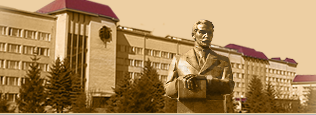TRADITIONALISM AND INNOVATIONS IN GEOGRAPHY.
The traditions in the science are determined logical connections within the theories and certain historical and cultural conditions. The traditions and innovations are inseparably connected forming the complex process of the development of science. The present formulation of synergetic paradigm causes the change of the methodology. The scientific rationality as the essence of the theoretical thinking includes the variants of the objective and subjective. The traditionalism of the scientific rationality causes the nebulosity of the methodological limitation concerning the scientific knowledge. The development of science forms normal (traditional) and revolutionary (innovative) periods. The traditionalism of science provides permanent exchange of information between the empiric and theoretical cognition. Explanatory schemes (programs) for facts are provided by theories. The science as well as methods, principles, theory and the whole scientific picture of the world change during the innovations. Discoveries take place not only during revolutions (innovations) but during evolutions (traditions) as well. The complex nature of geography demands long analytical preparations for a synthetic work and due to it the science gains the perfect form. Besides, not all factors of the geographical complex are studied equally. The solid foundation is formed due to the observation; its structure is based on the permanent joint work of observation and thought. The first one provides facts, the second one makes relative conclusions based on the facts that are checked by new observations. Because of the growth of specializations, geography has lost the objectivity of adjacent sciences as its scientific tasks have been divided between special filial sciences. However, this isolation gives the possibility to study its substantive field and fill its substantive validity.
Keywords: tradition, innovation, science, geography, methodology.
References:
- Vernadskiy V.I. Izbrannyie trudyi po istorii nauki / Vladimir Ivanovich Vernadskiy; [Sostaviteli M. S. Bastrakova i dr.; vstupit. statya S. R. Mikulinskogo, S. 5 – 31]. – M.: Nauka, 1981. – 359 s.
- Kuznetsova N I. O raznoobrazii nauchnyih revolyutsiy /N. I. Kuznetsova, M. A. Rozov // Traditsii i revolyutsii v istorii nauki [Sb. st.] AN SSSR. In-t istorii [Otv. red. P. P. Gaydenko.]. – M. : Nauka, 1991. – S. 60-83.
- Kun T. Struktura nauchnyih revolyutsiy./ Kun.[ Per. s angl. I.Z. Naletova. Obsch. red. i posleshsl. S. R. Mikulinskogo i L.A. Markovoy.]. – M., “Progres”, 1975. – 287 s.
- Lakotos I. Istoriya nauki i ee ratsionalnyie rekonstruktsii / I. Lakatos //Struktura i razvitie nauki. – M.: Progress, 1978. – S. 219-220.
- Lakotos I.. Metodologiya nauchnyih issledovatelskih programm / I. Lakatos // Voprosyi filosofii. – 1995. – #4. – S.135 – 154.– s.135).
- Moroz S. A. Metodologiya geografichnoyi nauky`: Navch. posibny`k / S. A. Moroz, V. I. Onopriyenko, S. Yu.Bortny`k – K.: Zapovit, 1997. – 333 s.
- Novakova N. O. Ideyi evolyuciyi ta revolyuciyi v ukrayins`kij polity`chnij dumci kincya XIX – poch. XX stolittya / N. O. Novakova: dy`s. na zdobuttya nauk. stupenya kand. polit. nauk. – K., 2009. – 19 s.
- Popper K. Logika nauchnogo issledovaniya /K. Popper // Logika i rost nauchnogo znaniya: Izb. rabotyi. s angl./ Sost.,obsch. red. i vstup. st. [S.5 – 32] V.N. Sadovskogo. – M.: Progress, 1983. – 605 s. – (Dlya nauch. b-k). – S. 34 – 235.
- Rudny`cz`ky`j S. Zemleznannya yak samostijna pry`rodny`cha nauka /S. Rudny`cz`ky`j //Visny`k pry`rodoznavstva. – X., 1927. – #1. – S. 12-23.
- Savost`yanova M.V. Aksiologichni osnovy` kry`ty`ky` parady`gmal`noyi nauky` /M. V. Savost`yanova . – Avtor dy`s. na zdobuttya nauk. stupenya d-ra filos. nauk. – K., 2009. – 32 s.
- FeyErabend P. Izbrannyie trudyi po metodologii nauki /P. FeyErabend, [Perevod s angl i nem. Nikiforova; Obsch. red. i vstup. st. [s. 5 – 28] I. S. Narskogo]. – M.: Progress, 1986. – 542 s.
- Chujko V. Interpretaciya ta rekonstrukciya naukovogo znannya / V. Chujko // Filosofs`ka dumka. – K., 1999. – #5. – S.57-81.
- Krebs, N. Revolution und Evolution in der Geographie /Norbert Krebs //Mitteilungen der Geographischen Gesellschaft in Wien. – 72 (1929). – S. 334 – 345.
FULL TEXT:
